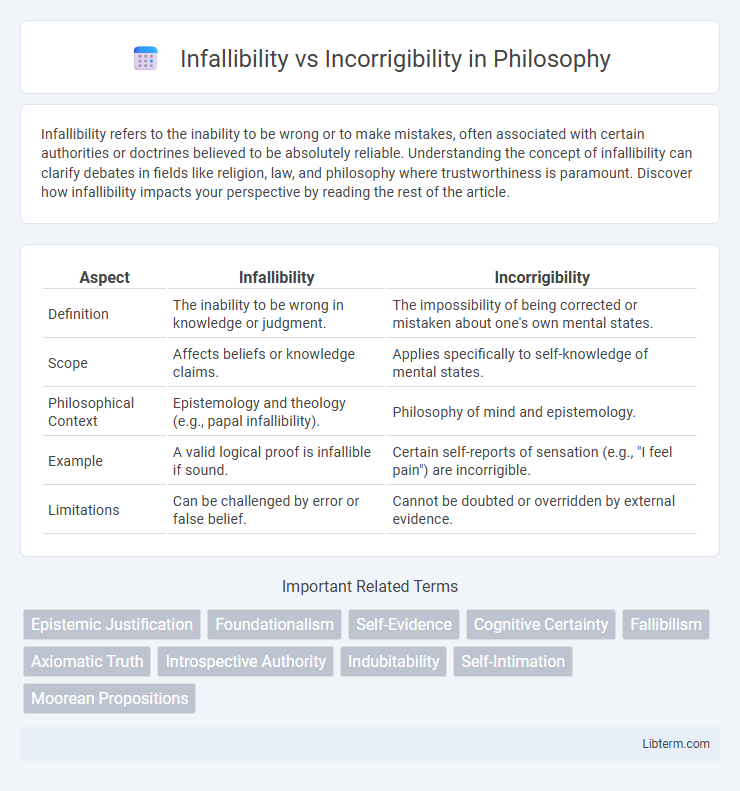Infallibility refers to the inability to be wrong or to make mistakes, often associated with certain authorities or doctrines believed to be absolutely reliable. Understanding the concept of infallibility can clarify debates in fields like religion, law, and philosophy where trustworthiness is paramount. Discover how infallibility impacts your perspective by reading the rest of the article.
Table of Comparison
| Aspect | Infallibility | Incorrigibility |
|---|---|---|
| Definition | The inability to be wrong in knowledge or judgment. | The impossibility of being corrected or mistaken about one's own mental states. |
| Scope | Affects beliefs or knowledge claims. | Applies specifically to self-knowledge of mental states. |
| Philosophical Context | Epistemology and theology (e.g., papal infallibility). | Philosophy of mind and epistemology. |
| Example | A valid logical proof is infallible if sound. | Certain self-reports of sensation (e.g., "I feel pain") are incorrigible. |
| Limitations | Can be challenged by error or false belief. | Cannot be doubted or overridden by external evidence. |
Understanding Infallibility: Definition and Context
Infallibility refers to the inability to make errors or be wrong in specific contexts, such as theological doctrines or authoritative statements. It is often associated with institutional or doctrinal certainty, implying an unerring truth in particular proclamations. Understanding infallibility requires examining its application in religious, legal, or epistemological frameworks where absolute correctness is claimed or expected.
Decoding Incorrigibility: Meaning and Implications
Incorrigibility refers to statements that are necessarily true and cannot be proven false by the speaker, highlighting a unique form of epistemic certainty. Unlike infallibility, which implies freedom from error, incorrigibility emphasizes the self-verifying status of knowledge claims, often linked to first-person expressions like "I am in pain." Understanding incorrigibility reveals implications for epistemology and philosophy of mind, particularly in dissecting the nature of self-knowledge and the limits of subjective certainty.
Historical Roots of Infallibility and Incorrigibility
Infallibility and incorrigibility stem from distinct philosophical and theological traditions with historical roots tracing back to classical antiquity and medieval scholasticism. Infallibility, often associated with papal authority and divine guidance, emerged prominently during the Middle Ages within Catholic theology, emphasizing an unerring doctrinal truth. Incorrigibility, rooted in Cartesian philosophy, particularly Descartes' theory of self-awareness, highlights the indubitable nature of certain beliefs based on the impossibility of error in self-knowledge.
Philosophical Perspectives on Infallibility vs Incorrigibility
Philosophical perspectives on infallibility emphasize the absolute impossibility of error in knowledge or belief, often associated with divine or epistemic certainty. Incorrigibility, in contrast, pertains to the epistemic status of beliefs that cannot be corrected by experience, usually linked to self-knowledge or first-person authority. The debate explores whether infallibility requires incorrigibility or if incorrigible beliefs can nonetheless be fallible, impacting theories of knowledge and self-consciousness.
Key Differences Between Infallibility and Incorrigibility
Infallibility refers to an entity's inability to make errors under any circumstances, often applied to authoritative figures or systems, while incorrigibility denotes a person's or system's resistance to correction despite errors. The key difference lies in infallibility being an absolute absence of mistakes, whereas incorrigibility implies persistence in erroneous behavior or beliefs despite attempts at correction. Infallibility is often associated with doctrinal or philosophical contexts, whereas incorrigibility is commonly used in behavioral or psychological discussions.
The Role of Authority and Error in Infallibility
Infallibility refers to the inability to be wrong, often attributed to an authority whose statements or decisions are considered absolutely true within a specific domain. Incorrigibility, on the other hand, pertains to a person's resistance to correction despite being in error, highlighting psychological rather than epistemic certainty. The role of authority in infallibility is central, as it confers a status that shields against error, whereas error in infallibility is viewed as impossible under defined conditions, contrasting with incorrigibility where error exists but is uncorrected.
Psychological Foundations of Incorrigibility
Incorrigibility in psychology refers to the unchangeable nature of certain beliefs or attitudes, rooted in deep cognitive biases and self-validating mechanisms within the human mind. Unlike infallibility, which implies absolute correctness or truth, incorrigibility emphasizes the persistence and resistance to change of mental states despite contradictory evidence. Research highlights that incorrigibility arises from neural and psychological foundations such as confirmation bias, cognitive dissonance, and emotional reinforcement, making some beliefs impervious to correction or revision.
Infallibility and Incorrigibility in Epistemology
Infallibility in epistemology refers to the idea that a belief or knowledge claim cannot be false, ensuring absolute certainty and reliability. Incorrigibility denotes the property of a belief that cannot be corrected or revised by the subject, implying it is immune to error from the believer's perspective. The distinction lies in infallibility being an objective guarantee of truth, whereas incorrigibility pertains to the subjective impossibility of error in self-ascription of mental states.
Practical Applications: Faith, Knowledge, and Certainty
Infallibility implies an inability to err, often applied to certain religious doctrines or authoritative knowledge claims, ensuring unwavering faith and absolute certainty in those contexts. Incorrigibility denotes beliefs or knowledge that cannot be proven wrong by the subject, reflecting immediate self-evidence, crucial in establishing foundational certainty in epistemology. Practical applications of infallibility secure doctrinal adherence, while incorrigibility underpins personal knowledge claims, both reinforcing the certainty necessary for faith and rational understanding.
Contemporary Debates on Infallibility vs Incorrigibility
Contemporary debates on infallibility vs incorrigibility center on the epistemic reliability of beliefs versus the unchangeable nature of certain mental states. Infallibility is discussed as the capacity to be immune from error in specific contexts, such as perception or introspection, whereas incorrigibility refers to the impossibility of being proven wrong by external evidence, often linked to a first-person authority. Philosophers analyze how these concepts impact theories of knowledge, self-awareness, and the limits of skepticism, highlighting tensions between objective verification and subjective certainty.
Infallibility Infographic

 libterm.com
libterm.com